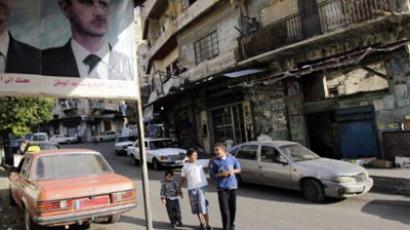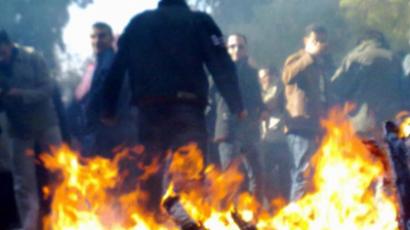Atrocity scouts on the ground in Syria
Arab League monitors are starting their observation mission in Syria in the hope of salvaging prospects for peace in the conflict-torn country. Western nations and some others are increasing their pressure on Damascus and say the regime is doomed.
An advance party of Arab League observers arrived in Syria on Thursday with the aim of helping to stabilize the conflict-torn country. The mission is part of a roadmap for peace which the League and Syria signed on Monday.The group, composed of roughly 30 observers as well as several journalists, is meant to pave the way for a much larger mission which will join the team later, possibly as early as Sunday.Once the full team is in place, it will number almost 200 monitors. At its head is the Sudanese former intelligence chief Mohamed Ahmed Mustafa Al-Dabi, who now holds a senior position in the country’s foreign ministry.Under the agreement, the monitors will have access to conflict zones as well as Syrian prisons, police stations and hospitals. Their mission is to establish how much effort the Syrian government is putting into ending the bloody conflict which has claimed thousands of lives over the year.Damascus has undertaken to withdraw army troops from cities and release prisoners. The observer team will also have an eye on the actions of the opposition, which the government accuses of constantly attacking its security forces and civil servants. According to latest government estimates cited by the state news agency, SANA, some 2,000 deaths reported over the months of the conflict are army soldiers and officers. The UN estimates the total death toll in Syria at more than 5,000.Syrian Foreign Ministry spokesman Jihad Makdissi pointed out that the monitor mission is important for Damascus because it will allow the Arab League to confirm that the situation in the country is far from the “black-and-white picture presented by some media.”Russia echoed the expectation, saying that “the presence of the observers of the Arab League will help the world community get a more objective picture of what is happening in Syria and will help… stimulate internal dialogue without foreign influence,” Russian Foreign Ministry spokesman Aleksandr Lukashevich said on Thursday.Other nations are much more skeptical about prospects for the roadmap. Washington reiterated that President Bashar Assad’s regime is bound to fall.“The regime has been cut off by the Arab League, by its traditional allies and neighbors like Turkey, and the regime is under increasing financial duress due to international sanctions and weak domestic economic policies. It is only a matter of time before this regime comes to an end,” White House Press Secretary Jay Carney said on Thursday.And the State Department called on US citizens in Syria to seize the opportunity and leave the country.Syria is under increasing pressure from international sanctions, which are aimed at putting leverage on the government, but have also been hitting ordinary citizens, who are struggling to buy essentials like fuel and food. Japan is the latest country to place fresh sanctions on Damascus, restricting financial dealings with 18 individuals and 12 organizations in Syria.Meanwhile, the UN Security Council is debating amendments to a Russian and Chinese-sponsored draft resolution on the situation in Syria. The two permanent members had earlier blocked another draft resolution and proposed their own variant, which they say is more balanced. However other members are reluctant to agree on certain provisions, for instance not distinguishing between state violence and violence committed by the opposition in terms of condemnation. Work in the Security Council has proved difficult so far, but efforts are expected to continue.














